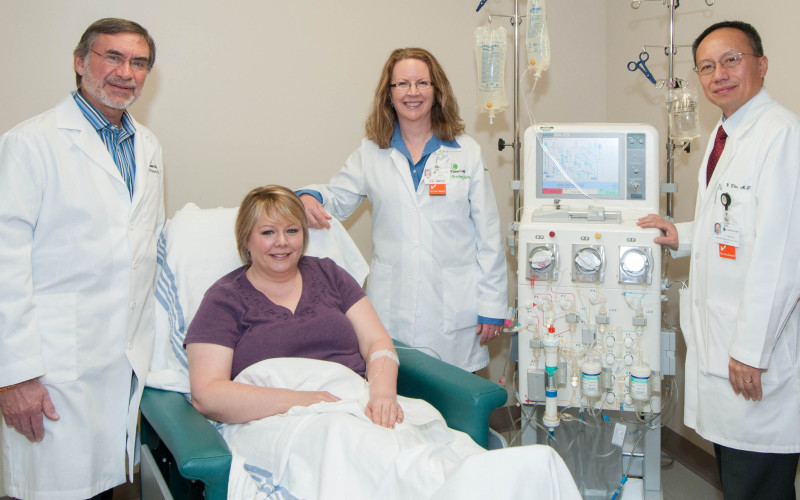Christiana Care offers Delaware’s first apheresis option for treating familial high cholesterol disorder

Leigh Runyan works full-time and goes to school part-time. Every day, she lives with familial hypercholesterolemia (FH), a rare genetic disorder characterized by high levels of low-density lipoproteins (LDL), commonly known as bad cholesterol.
Every two weeks, she spends about four hours at Christiana Care’s new LDL Apheresis center, the first in the Delaware area. The program — a collaboration between the Center for Heart & Vascular Health and the Ambulatory Infusion Center at Christiana Hospital — was set up to treat people with the disorder who don’t respond to statins, the medication traditionally used to control FH.
Runyan is the center’s first patient.
“I don’t have the luxury of taking an entire day twice a month to go to Philadelphia,” she said. “At Christiana Care, I get expert care, the very latest in technology and a lot more convenience.”
If not treated, 50 percent of people with FH develop cardiovascular disease by age 55. Many suffer a stroke or heart attack at an even younger age. Runyan’s mother was not yet 30 when she had her first open-heart surgery. Runyan, 46, was diagnosed with the disorder at age 8 when she was screened because of her family’s history. For years, she treated the disorder with statins and a heart-healthy diet. But neither approach kept her LDL levels under control.
“After seeing my mother and other people in my family have so many heart surgeries, I was determined to find a solution,” she said. Runyan’s search led her to Edward M. Goldenberg, M.D., director, Preventive Cardiology, at the Center for Heart & Vascular Health, who has a special interest in lipid management.
“As it turned out, we were looking for our first LDL apheresis patient — and she found us,” Dr. Goldenberg said.
Apheresis is a procedure much like dialysis in which the patient’s blood is removed from the body and separated so that a harmful substance can be removed. At the infusion center, two needles are inserted into the patient’s veins, one in each arm. Blood is continuously withdrawn and run through a machine that separates the plasma from the red and white blood cells. The plasma is then pumped into a LDL-adsorption column that selectively removes the bad cholesterol.
“You can actually see the blood separating from the cholesterol,” said Beth Bradley, APN, ACNS-BC, clinical leader, Cardiovascular Prevention Program.
The procedure takes about four hours and is repeated every two weeks.
“It’s a very safe procedure and very effective,” said Yong Zhao, M.D., medical director, Transfusion Service. “Typically, we see about a 75 – 80 percent reduction in LDL.”
After her first treatment, Runyan’s LDL count went down 81 percent. Patients with FH that doesn’t respond to medication can rely on apheresis as a long-term treatment or as a bridge until more effective medications are developed.
On her treatment days, she calls about an hour ahead so nurses can set up the machine. Christiana Hospital is the most convenient site for Runyan, who lives in Lincoln University, Pa., and studies at the University of Delaware in Newark.
“We go to great lengths to make patients comfortable, with pillows, a heating pad, a TV,” said Kathy Hinckle, RN, BSN, MSHA, supervisor, Ambulatory Infusion Center. “Apheresis takes several hours, and we appreciate our patients’ commitment.”